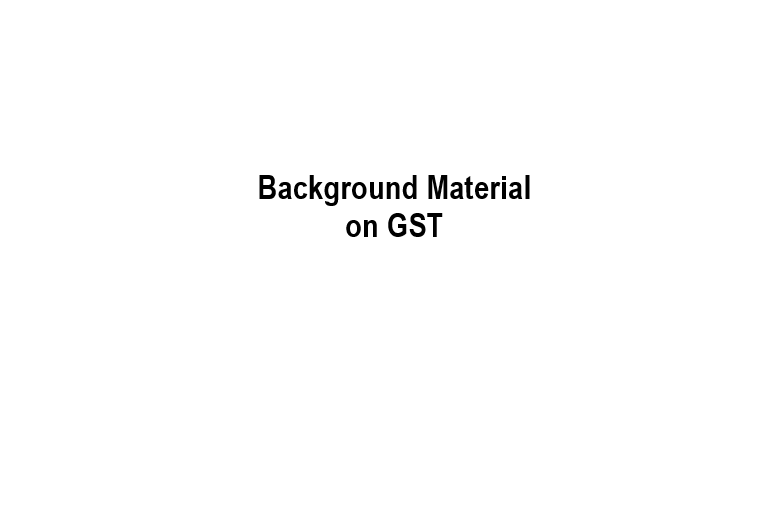9th Revised Background Material on GST Volume-I: ICAI
Table of Contents
9th Revised Background Material on GST Volume-I: ICAI
Chapter 1 Preliminary
1. Short title, extent, and commencement
2. Definitions
Statutory Provision
1. Short title, extent, and commencement
(1) This Act may be called the Central Goods and Services Tax Act, 2017.
(2) It extends to the whole of India except the State of Jammu and Kashmir.
(3) It shall come into force on such date as the Central Government may, by notification in the Official Gazette, appoint:
Provided that different dates may be appointed for different provisions of this Act and any reference in any such provision to the commencement of this Act shall be construed as a reference to the coming into force of that provision.
1. The Central Goods and Services Tax Act, 2017 has been implemented in the State of Jammu and Kashmir from 8th July 2017 through Constitution (Application to Jammu and Kashmir) Amendment Order, 2017, the Central Goods and Services Tax (Extension to Jammu and Kashmir) Ordinance, 2017 and the Integrated Goods and Services Tax (Extension to Jammu and Kashmir) Ordinance, 2017.
2. Certain provisions came into force on 22.6.17 and remaining provisions on 1.7.17 as notified by the Central Government and hence appointed day for the CGST Act, IGST, UTGST Acts, SGST Acts was 1st July 2017. However, the appointed day for the State of Jammu and Kashmir was 8th July 2017.
3. With the Jammu and Kashmir Reorganization Act, 2019 has come into effect from 31 Oct 2019 although Presidential assent was received on 9 Aug 2019, (i) J&K GST Act is made applicable to UT of J&K and UTGST Act is applicable to UT of Ladakh (ii) ‘tax period’ has been amended to be from 1 Oct to 30 Oct and 31 Oct to 30 Nov vide notification 62/2019-CT dated 26 Nov 2019 and (iii) special transition procedure till 31 Dec 2019 with a ‘TO based credit transfer option’ along with new registration in UT of Ladakh.
Related Topic:
Free pdf download GST background material by ICAI
Title:
All Acts enacted by the Parliament since the introduction of the Indian Short Titles Act, 1897 carry a long and a short title. The long title, set out at the head of a statute, gives a fairly full description of the general purpose of the Act and broadly covers the scope of the Act.
The short title serves simply as ease of reference and is considered a statutory nickname to obviate the necessity of referring to the Act under its full and descriptive title. Its object is the identification, and not description, of the purpose of the Act.
Extent:
Part I of the Constitution of India states: “art. 1 India, that is Bharat, shall be a Union of States”. It provides that territory of India shall comprise the States and the Union Territories specified in the First Schedule of the Constitution of India. The First Schedule provides after the reorganization of J&K and unification of UT of Dadra and Nagar Haveli and UT of Daman and Diu vide Dadra and Nagar Haveli and Daman and Diu (Merger of Union Territories) Bill, 2019, we now have twenty-eight (28) States and eight (8) Union Territories.
Part VI of the Constitution of India provides that for every State, there shall be a Legislature, while Part VIII provides that every Union Territory shall be administered by the President through an ‘Administrator’ appointed by him. However, the Union Territories of Delhi and Puducherry have been provided with Legislatures with powers and functions as required for their administration.
India is a summation of three categories of territories namely – (i) States (28); (ii) Union Territories with Legislature (3); and (iii) Union Territories without Legislature (5).
Other Relevant Articles of the Constitution
The readers who wish to have a deeper understanding of GST may examine the articles of the Constitution which were amended vide Constitution 101st Amendment Act, 2016 which received Presidential assent on 16 Aug 2016 and are relevant to GST. Brief of each is provided hereunder:
Articles 245(2): Law not invalid on the ground that has extraterritorial jurisdiction. Important for Place of supply – Section 11, 13 of Integrated Goods and Services Tax Act, 2017.
Article 246: Sets out that Parliament has exclusive powers to tax activities in List I; State legislature has exclusive powers to tax activities in List II, and both have concurrent powers to tax activities in List II. GST is NOT levied under the legislative powers traceable to art. 246.
Article 246A(1): Amendment provides notwithstanding Article 246 and subject to article 254(2), Parliament and State legislature have the power to impose a tax on goods and services. Within the State, GST is levied under the law-making powers traceable to art. 246A.
Article 246(2): Further only parliament has powers to tax interstate activities.
Article 249: Parliament has overriding power in GST.
Article 250: Parliament has overriding power in case of emergency
Article 254: Inconsistency in law- Parliament has powers to supersede.
Article 268: Stamp duties are in Union list- collected by State.
Article 269: Imports deemed to be an interstate activity. Interstate taxes collected apportioned as per the GST Council recommendation.
Read & Download the full copy in pdf:
 ConsultEase Administrator
ConsultEase Administrator
Consultant
Faridabad, India
As a Consultease Administrator, I'm responsible for the smooth administration of our portal. Reach out to me in case you need help.








